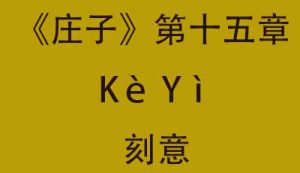The Chapter 15 of Zhuangzi( “Ke Yi”)

Zhuangzi’s “Ke Yi”: Why Trying Too Hard Backfires (And How to Chill Like a Sage)
So, imagine you’re at a party. There’s that one person desperately trying to be funny—pushing jokes, sweating, forcing laughter. Meanwhile, the coolest person in the room is just vibing, cracking one-liners without effort, and everyone naturally flocks to them. That’s the core idea of Ke Yi: forced action (刻意 ke yi) sucks; spontaneous flow (自然 zi ran) rules.
Zhuangzi, the OG Taoist philosopher, uses this chapter to roast people who overthink, over-plan, and try too hard to be “virtuous,” “wise,” or “heroic.” He’s like, “Bruh, stop straining. You’re blocking your own Tao.” Let’s unpack it.
1. The Problem: Forced Intent = Spiritual Cringe
Zhuangzi opens by listing five types of try-hards:
- The Morality Police: Folks who rigidly follow Confucian rules, judging everyone who doesn’t.
- The Self-Help Junkie: People obsessed with “bettering” themselves (like ancient hustle-culture bros).
- The Political Grinder: Ministers who stress over “fixing the world” but burn out.
- The Hermit Monk: Ascetics who force detachment but are low-key proud of their “holiness.”
- The Gym Bro of Spirituality: Those doing breathwork/yoga/rituals for clout, not inner peace.
His point? All these folks are trying to be something, which means they’re not being natural. It’s like flexing in the mirror 24/7—exhausting and kinda sad.
Modern analogy: Think of influencers curating “perfect” lives. The harder they force it, the faker it feels. Zhuangzi would’ve roasted Instagram spirituality hard.
2. The Fix: Wu Wei (Effortless Action)
The opposite of ke yi is wu wei (无为)—doing without forcing. Zhuangzi describes the ideal person:
“They don’t meditate to be wise, don’t preach to be kind, don’t chase wealth, don’t ‘fight’ for health. They just… exist, like water flowing downhill.”
Key traits:
- No ego-struggle: They don’t try to be humble—they just are.
- Adaptability: Like a cat napping in sun or shade, they adjust without drama.
- Zero obsession with outcomes: Think of a chef who cooks for joy, not Michelin stars.
Real-life example: Ever met someone who’s naturally generous? They don’t post “Look how charitable I am!”—they just hand you their last fry. That’s wu wei.
3. Nature’s Way: Why Trees Beat Statues
Zhuangzi loves nature metaphors. Here’s one:
- A carved statue is impressive, but it’s dead—no growth, no change.
- A wild tree? Ugly maybe, but alive, flexible, free.
Forced virtue (like rigid rules) is the statue; spontaneous goodness is the tree. The moment you try to be “good,” you’re stuck in a performance.
Deep cut: This echoes Daodejing’s “The highest virtue isn’t virtuous” (上德不德). True goodness doesn’t need labels.
4. The Bigger Picture: Trust the Tao
Zhuangzi’s ultimate advice? Stop micromanaging your life. The Tao (道, the “Way”) flows on its own. Trying to control everything is like a river fighting its current—you’ll drown in stress.
His vibe:
- For plans: Prepare, but don’t white-knuckle outcomes. (Like dating: Be yourself, don’t force chemistry.)
- For morals: Help others because you care, not to “be a hero.”
- For goals: Work hard, but don’t tie your worth to results.
Modern twist: Ever notice how the best ideas come in the shower? That’s wu wei—your brain working without you forcing it.
5. Why This Matters Today
Ke Yi is a antidote to:
- Hustle culture: “Grind 24/7!” → Zhuangzi: “Or… nap when tired?”
- Perfectionism: “I must be flawless!” → “Nah, flaws are part of the flow.”
- Virtue signaling: “Look how woke I am!” → “Just be kind quietly.”
Zhuangzi’s mic drop:
“The perfect man is like a mirror—reflects without clinging, responds without straining.”
Final Takeaway: How to “Ke Yi” IRL
- Notice forced actions: Are you studying to learn, or to flex grades? Working for passion, or clout?
- Embrace “good enough”: Not lazy, just not obsessive. (Your 80% effort might be someone else’s 110%.)
- Let go of labels: Don’t try to be “wise” or “kind”—just act when needed.
TL;DR: Life’s easier when you stop forcing it. Be like water, not a bulldozer.
